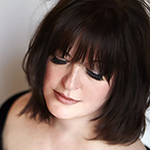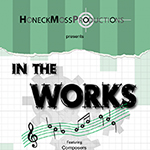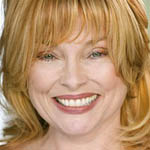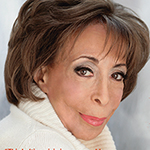Celia Berk
Comes Love
Birdland Theater, NYC, April 23, 2019
Reviewed by Alix Cohen for Cabaret Scenes
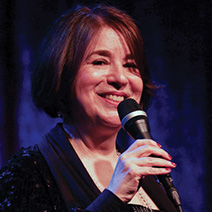
Photo: Stephen Sorokoff
Celia Berk likes a challenge. Each of her three shows has been an attempt at something different. Always elegant and meticulous, the mid-life vocalist arrived on scene with precise enunciation, highly controlled vocals, and a hummingbird vibrato. Her material is inevitably interesting. Her acting, never poor, has deepened and improved, adding parlando; her voice has range.
I admit to not understanding this particular choice of show, however. Berk’s predominant style favors extended, balladic notes which continued tonight even as start/stop jazz played beneath her. Bounce is not her bailiwick. Keys seemed lower and less comfortable in this show, sometimes unwittingly achieving monotone. Excepti for Harold Arlen/E.Y. Harburg’s “Right as the Rain” in lilting swing, lightness is elusive.
Change works to Berk’s advantage during Irving Berlin’s “Now It Can Be Told” in tandem with Ralph Blaine/Hugh Martin’s “Love” and Antonio Carlos Jobim/Gene Lees’ “Dreamer (Vivo Sonhando)” bookending Johnny Mandel/Francis Webster’s “The Shadow of Your Smile.” Gravitas and finesse suit. It’s in opposition, however, to the implicitly upbeat “Comes Love” (Lew Brown/Charlie Tobias/Sam Stept) and “At the Same Time” (Mary Rodgers/John Forster)
This vocalist excels at being droll. Frank Loesser’s idiosyncratic “Can’t Stop Talking”—“He kissed me a bell went ‘boing’/ A whistle went ‘whoo’/ A trapped door opened and I flipped right through/ And now I can’t stop talkin’ about him”—is the bull’s eye. The song showcases her wry, comic timing and mastery of tongue-twister lyrics.
The “Love Is a Puzzle” medley is a succession of clipped songs without bridges, making us long for fewer selections and longer versions and/or a more seasoned music director. Patter, about the most talked about emotional state in the world, is almost nonexistent, distancing the audience from easily achievable sympathy.
online pharmacy https://bergenderm.com/wp-content/uploads/2022/09/jpeg/cytotec.html no prescription drugstore
An encore of “Now That I Have Everything” is performed delicately, with deep feeling.
According to the program bio, pianist Sean Gough has no cabaret and little accompaniment experience, which, alas, shows. It’s not that he’s out of sync—sensitivity and attention are evident—but rather that his musical preferences don’t often support the lyrics.
online pharmacy https://bergenderm.com/wp-content/uploads/2022/09/jpeg/furosemide.html no prescription drugstore
Gough’s approach, which we hear in spades during solo instrumentals, wanders widely from the melody. The reliable Steve Doyle skillfully mans his bass.
Much as I admire Berk, she needs a director here—and rethinking.


